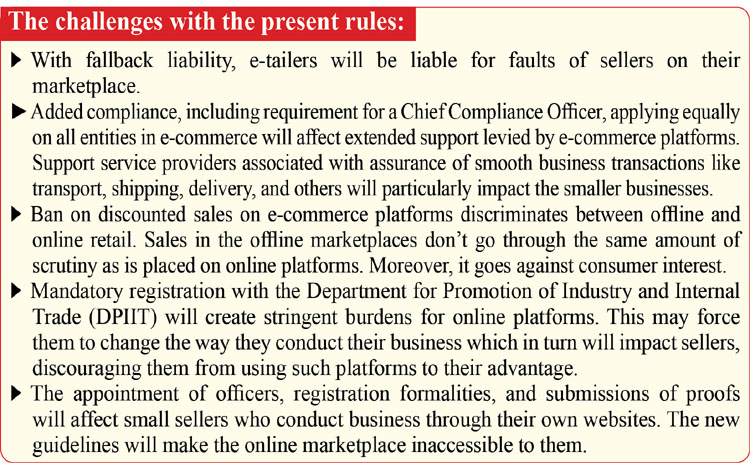India is home to approximately 6.3 crore MSMEs, contributing around 6.11 percent of the manufacturing GDP and 24.63 percent of the GDP from service activities to the country. The sector also commits approximately 33.4 percent to the country’s manufacturing output through national and international trade. The pandemic gave MSMEs an opportunity to leverage e-commerce and online platforms to continue their businesses, enabling them with global infrastructure and digital support to stay afloat during these turbulent times. However, the recently issued amendments to the draft e-commerce rules will disrupt the growth of small businesses and in serving the interests of consumers. This shift could have catastrophic impact on the economy and India’s thrust to emerge as a global business destination.

Sharing his opinion on the ecommerce rules, Mr. Vinod Kumar, President, India SME Forum, said, “The amendments increase compliance burden on e-commerce entities and make the marketplace inaccessible to small and medium businesses who depend on these entities for sustenance. It is important for the government to revisit these rules and detangle the complexities.” According to industry experts, the rules in its current form bring uncertainty to the entire e-commerce ecosystem and creates an unlevel playing field for online and offline sellers. E-commerce needs less barriers and priority should be given to digital readiness. E-commerce policies are already consumer centric. Clamping down a majority of the businesses and suffocating the industry for the 2-3% scrupulous sellers who wrong consumers seems arbitrary and overly harsh. The policies should aim to focus not only on consumers but also the sellers, as that also eventually leads to the benefit of the consumers. These rules, if implemented, can have an obstructive impact on the economic development of the country with respect to job opportunities, scope for the growth of MSMEs, global investments, and, in turn, overall consumer experience. The need of the hour is to have a graded approach, instead of a one-size-fits-all approach. That gives businesses room to grow while strengthening the MSME ecosystem in India. Retail needs to be looked at comprehensively, not in a fractured manner where online is discriminated against with regard to offline.
Dr. J. S. Juneja, Former CMD, NSIC, Vice Chairman, India SME Forum said, “Regulations should ideally facilitate the markets for both consumers and sellers. The proposed guidelines don’t intend to do that. E-commerce is a means of assisting MSMEs to market their products. As long as MSMEs get a platform to sell, earn and grow from, it’s a productive engagement.” “No one is fundamentally against regulating the sector. There is a need for it. However, the current guidelines miss their mark by a significant margin and need to be clarified for the industry. In terms of the cost of selling, we need to understand that when you place an excessive amount of compliance on any entity, a part of that burden does trickle down. With regard to the draft rules, a sizable amount of compliance burden will shift to small sellers,” argued Smt. Nirupama Soundararajan, Senior Fellow and Head of Research, Pahle India Foundation.
Shri Ram Rastogi, Digital Payments Strategist feels that, “The Department of Consumer Affairs should consult industry veterans before taking a policy decision. We should put the rules on hold, carry out stakeholder conversations and then come out with comprehensive guidelines. We should try and create an opportunity for those who want to shift and take advantage of the digital framework. It is important that we help the market grow and not kill it.” Shri Ravi Bansal, Global E-commerce Head, Unyscape said, “Online retail has empowered the consumer to select from a variety of brands and products. We need to figure out who we want to help with these policies, how we can facilitate and make sure that everyone is benefitting from the ecosystem instead of just a few players. The new norms should benefit the consumer regardless of whether they’re shopping online or offline.” Shri Ajit Balakrishnan, Founder and CEO Rediffmail Enterprise said, “Our goal should be to think about how we can make the rules as inclusive as possible. We should approach the government with a cooperative approach. The rules need to be drafted in a way that they don’t cause confusion.”
As per a recent poll conducted by the India SME Forum, 94% sellers in Gujarat, 83% sellers in Tamil Nadu and Telangana, 89% sellers in Karnataka, 93% sellers in Maharashtra 100% sellers in Rajasthan and 92% sellers in Delhi are of the opinion that the draft e-commerce rules will cause irrevocable damage to MSMEs and need to be reconsidered. Around 4288 sellers have signed the petition requesting the government to hold stakeholder consultations and further deliberations before finalizing the proposed changes to the draft policy. Having withered two waves of a devastating pandemic, MSMEs need all the support they can get from policy makers. The draft rules are not only counterproductive but will be more damaging in the long run than COVID itself since these rules will be permanent. In this regard, the sellers and ISF have agreed to approach the government and make their voices heard before the 21 July deadline.

